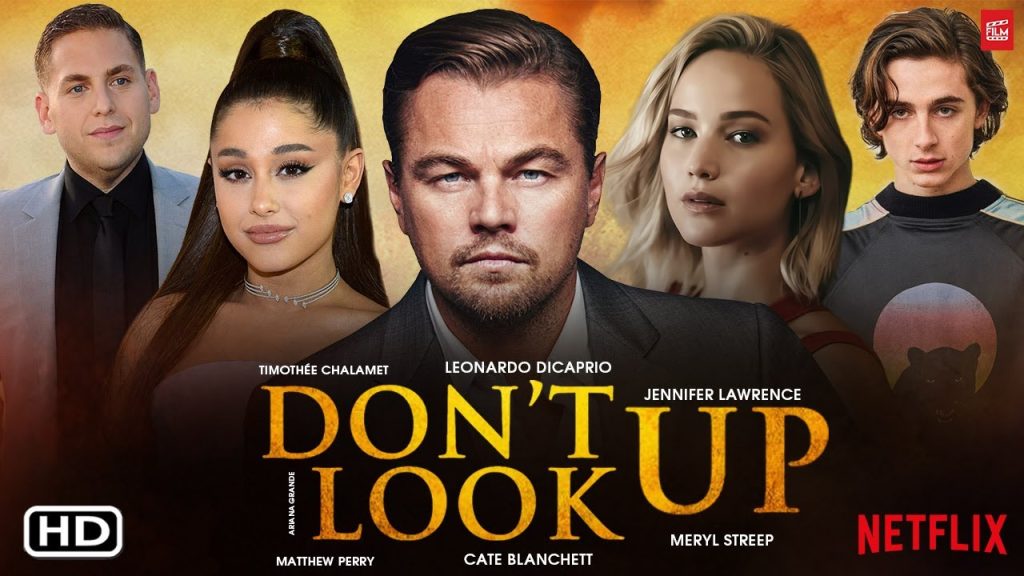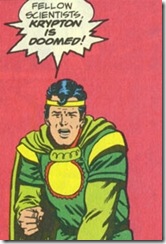[SPOILERS AHEAD – I wouldn’t want to disappoint you before the movie itself does.]

“There’s a new movie on Netflix with Meryl Streep and Leonardo DiCaprio,” said my wife. That was enough for me. I enjoy the work of both actors. The Iron Lady, Mamma Mia, Titanic, Once Upon a Time in Hollywood. Said movie also starred Jennifer Lawrence and featured Timothee Chalamet. I like both of them as well, though neither name put a film on my “must-see” list. Said movie was directed by someone named Adam McKay. I did not know who that was. I do now. He’s a former writer for Saturday Night Live and the screenwriter for a whole passel of Will Ferrell movies.
About the actors I can only say, “I hope it was just a paycheck.” With a lot of Listerine, I can probably wash the taste of Don’t Look Up out of my mouth and continue to watch their films.
About Adam McKay, I’ll say, “Stick to low comedy. It suits you.”
Don’t Look Up is the story of astronomers who discover that a Near Earth Object will soon impact the planet and cause an Extinction Level Event. They have a very hard time getting people to believe them. Then, when people do believe them, three missions to save the Earth fail. Two because corporate greed, the third because, well… the plot.
Don’t Look Up wants to be a satire. But is it?
sat·ire
the use of humor, irony, exaggeration, or ridicule to expose and criticize people’s stupidity or vices, particularly in the context of contemporary politics and other topical issues.
Oxford Languages
I get the impression that Director McKay thinks he’s made a Dr. Strangelove for the 21st Century. The problem is that Stanley Kubrick’s masterpiece, is, well, a masterpiece. It is clever, memorable, and actually beloved by people who work in the nuclear industry it criticizes. Dr. Strangelove is successful satire.
Don’t Look Up is Saturday Night Live brought to the big screen (and to streaming). It’s a Will Ferrell movie that somehow has the temerity to preach a sermon.
Is it satire? Well, it uses humor, or tries to. It features irony, but not on purpose. I’ll get to that shortly. It most certainly exaggerates, particularly by using the assured destruction of the earth by a foreign body as a metaphor for the gradual change of the Earth’s climate over time. It definitely exposes and criticizes stupidity—to wit:
The “heroes” of the story are emotionally unstable (Lawrence’s character loses her temper and begins shrieking on national television early in the film, then seems to fall into a state of utter apathy and goes off to shag skater boys) and vain (DiCaprio’s “Astronomer I’d Like to F__k” leaves his wife and sons to sleep with a news anchor with an apparent IQ lower than the size of his male endowment, though we’re assured she’s really just a bored genius.) A pop-singer who becomes the virtue-signaling mouthpiece for “Just Trust the Science” is rude, stupid and pretty much feral—an odd choice for a messiah, unless you’re from Hollywood, I suppose. The aforementioned news anchor and her cohost don’t know what to do when encountered with actual news, so they just yuck it up.
On the humor front, little of this is even a little amusing. Meryl Streep (because she’s Meryl Streep) is funny as a gender-swapped President Donald Trump, and some of her comedy gifts spill over onto Jonah Hill as her son/Chief of Staff.
So… I guess it is satire. But it’s badly executed satire. It’s overall not funny, and its criticism of specific stupidity drowns in the fact that it basically makes everyone look stupid. Indeed, about an hour into the film, I was thinking, “I really hope this movie ends with the destruction of the planet, because these people are all too stupid to live.”
(It does. Well, one of its required-in-2021 four endings is the destruction of Earth.)
Like all satire, Don’t Look Up tries to shape opinion. But here’s my question: what kinds of opinions does bad satire shape? Good satire is produced by people like Voltaire, like Oscar Wilde, like Stanley Kubrick. Good satire makes us laugh at ourselves as well as others. Good satire shapes opinions that are informed and sophisticated, because good satire is written by informed, sophisticated people.
Adam McKay, like most of his SNL cohorts, has strong, political sentiments, and he leverages them in his work to make his audience laugh at his political enemies and to ridicule anyone who disagrees with him. And herein lies a concern I’ve held for decades: too many of us get our news and allow our opinions to be shaped by the lowball comedy of people like Adam McKay. If ever the idea of “us vs. them” was prominently on display in America, it is on display in his work.
Coincidentally, only days before I saw this movie, I watched George Pal’s When Worlds Collide. I am currently re-reading Philip Wylie and Edwin Balmer’s novel of the same name, as well as its sequel. I mention this because the plot of Don’t Look Up is largely torn from When Worlds Collide. The stories are so similar that the estates of the authors could (and should) take McKay and collabortator David Sirota to arbitration and have their names put in the film credits.
When Worlds Collide (1951) was an early SF disaster film, produced by special effects powerhouse George Pal, in which astronomers sight not one but two Near Earth Objects, and in which the Earth is subsequently destroyed. In both films, a survival ship is sent away from Earth before the end. In both films, the survival ship is financed by an unprincipled industrialist. In both films, violence ensues as the end comes. Both films end with the Earth being decimated and the survival ship arriving safely on a new world.
The differences: When Worlds Collide is not a satire. It also does not contain the plot thread of people disbelieving the astronomers. It would not matter if it did, because the effort to save humanity as a species is not dependent upon the triplet Gods of the 21st Century—the President, the news media and dim-witted celebrities. Scientists in 1951 were apparently capable of existing without cronyism or fame, or at least the writers and directors thought so.
Don’t Look Up makes it clear that its authors disapprove of any effort to save the race using a survival ship. I’m guessing that, if it’s not possible to save the entire race, they consider it un-democratic to save some. (Perhaps Titanic shouldbe re-edited to show all hands going down with the ship? That’s just fair.)
At the end of When Worlds Collide, the head scientist sacrifices his own life and that of the industrialist to give the last of humanity a better chance to achieve escape velocity. In Don’t Look Up, the industrialist happily watches the President get eaten by a carnivorous ostrich, and becomes de facto leader of humankind.
When Worlds Collide also correctly assumes the complete destruction of Earth’s surface. Don’t Look Up actually shows trash floating in space to remind us that commercialism is bad. And then it has Jonah Hill surviving because he was in an underground bunker. I know, it’s comedy, but that still defies belief.
But where, indeed, is the irony? I promised it to you, didn’t I? Here you go:
The two films have one other key difference: In When Worlds Collide, the effort to save humanity is an international one. Although, because it was the Fifties, black and brown faces are not shown, the action begins in South Africa and scientists join the team from the world over. In the novels, in fact, it’s made clear that people in other nations are mounting their own space missions to save more people. The story we see is just focused on one of those missions.
Don’t Look Up takes a surprising (considering the Social Democrat politics of its creative team) “America First” attitude. NASA mounts a mission to destroy the incoming threat while the rest of the world twiddles its thumbs. Then the industrialist orders the President to scrub the mission at the last minute so he can harvest the meteor for minerals to make cell phones. Then the industrialist’s attempt to save Earth while maximizing profits fails. Only then, in the eleventh hour, does another nation try to save the earth. They fail spectacularly. Why? We’re not told. We’re left to assume that it’s because the rest of the world can’t do anything right if the United States doesn’t have a competent President.
Adam McKay, if his Twitter feed is to be believed, is very proud of his film. He has declared preemptively that any criticism of his film just proves he was right all along. He seems to genuinely expect his two-hour-plus screed to make people “wake up” and realize that, “Oh! Climate Change really is happening!” Adam McKay seems to believe—and it’s a time-honored belief in the entertainment industry—that most people are too dumb to even understand what scientists are saying, so they need to send in the clowns to explain things.
Adam McKay made this film to try and end the problem of Climate Denial.
But here’s the definition of Climate Denier:
cli·mate de·ni·er
a person who rejects the proposition that climate change caused by human activity is occurring.
Oxford Languages
What McKay and others who rail about Climate Deniers don’t realize is that their argument is not with people who don’t believe scientists, or who reject data that’s placed in front of them.
Those people are not McKay’s problem. His problem is with people like me, who absolutely accept the data that show a warming trend, a trend of change, and absolutely accept that humankind’s activities influence that trend. We just happen to reject the hysteria of people like McKay, and we reject their proposed solutions, because their solutions tend to be far more political and economic than scientific. And I think McKay knows that. So when he talks about “Climate Deniers,” I think he means something more like:
cli·mate de·ni·er
a person who rejects my proposed solutions to “fix” climate change.
ripped from the depths of steve’s bad attitude
After all, it’s better optics to pretend that people only disagree with you, not because your arguments may be flawed, but because they don’t trust science.
“Trust Science?” I don’t. Nobody should. Science doesn’t ask to be trusted. I accept science as a rational method of investigating the world around us and how it works. I accept (but usually question) peer-reviewed studies based on solid methodology and data collection. I adapt when new data becomes available. “Trust” has no place in that process.
What this particular instance of “Trust the science” is really asking us to trust are the flawed economic theories and anti-capitalist rhetoric of people like McKay. And to them I say, if you really care about science and the environment, then lay down your politics and let’s talk about solutions that aren’t hopelessly mired in your political philosophy of democratic socialism.


Couldn’t have described this trash film any better.